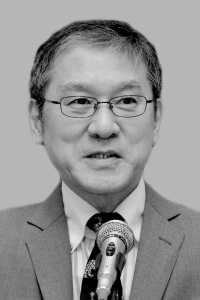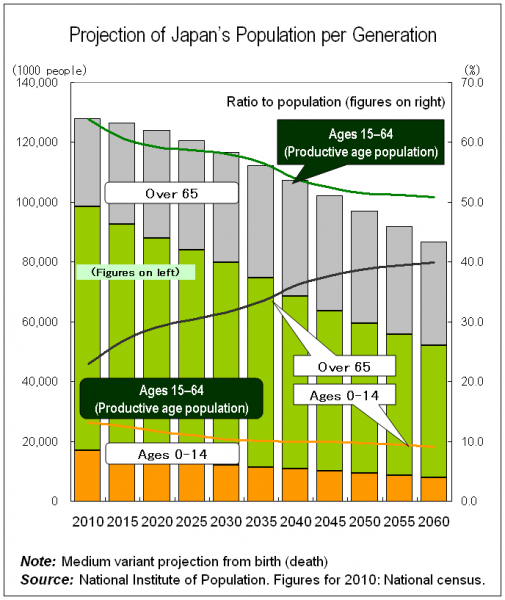Economics for winning: Be skeptical about commonly accepted views Viewing something that is commonly accepted from a different angle will lead to discovery
| Q: How poor will Japan become? |
| A: It’s already sufficiently wealthy; it won’t become poor even at zero growth. Japan faces a declining population and a rapidly aging society. A look at the future of Japan that Abenomics cannot forecast. |

TAKAHASHI Nobuaki, Professor, Ritsumeikan University
The reason why the Japanese public is worried that the nation could start to decline without growth is because past administrations have historically indicated that a recovery in the growth rate would reverse Japan’s economic depression and solve the problem of its aging society. But as the Japanese people already earn an average per capita gross domestic product (GDP) of close to 40,000 U.S. dollars despite still being worried about further growth to avoid becoming poor, from a historical and global perspective they are really quite unusual.
To avoid any misunderstanding, I must add that I am by no means saying that in the long run the growth rate of the Japanese economy could nominally or practically be zero, or maintain zero growth. Considering the increase in medical care services due to an aging society, the social costs required for environmental conservation, and the costs to repair an obsolete infrastructure, I believe that we should ideally maintain about 1 percent growth until around the middle of this century. But I want to make it clear that even a zero-percent growth rate over the long term would not make the nation any poorer than it is today or cause the health of the Japanese economy to deteriorate in any way.
 For example, according to a medium variant projection by the National Institute of Population and Social Security Research, over a twenty-year period, from 2010 to 2030, the labor force (the productive age population between ages 15 and 65) will decline by 17%, from 81.73 to 67.73 million people. If the nation sustains zero-percent growth during this time, per capita GDP will increase by more than 20%. That’s because sustaining even zero-percent growth would not be possible otherwise. In fact, even during the Twenty Lost Years (from 1991 to 2010), Japan’s labor productivity increased by about 20% per capita and about 30% per hour. In other words, if we assume that the national burden ratio for the next twenty years increases from its current 40% to 50% by a ratio of 10% or 50% in actual burden, the disposable income of the labor force population that bears this burden will not decrease, but will maintain its current level.
For example, according to a medium variant projection by the National Institute of Population and Social Security Research, over a twenty-year period, from 2010 to 2030, the labor force (the productive age population between ages 15 and 65) will decline by 17%, from 81.73 to 67.73 million people. If the nation sustains zero-percent growth during this time, per capita GDP will increase by more than 20%. That’s because sustaining even zero-percent growth would not be possible otherwise. In fact, even during the Twenty Lost Years (from 1991 to 2010), Japan’s labor productivity increased by about 20% per capita and about 30% per hour. In other words, if we assume that the national burden ratio for the next twenty years increases from its current 40% to 50% by a ratio of 10% or 50% in actual burden, the disposable income of the labor force population that bears this burden will not decrease, but will maintain its current level.
In terms of economic vitality, sustaining the current actual GDP of about 500 trillion yen would create quite a number of business opportunities. Even with zero-percent growth, society won’t keep producing/selling the same products and services year after year. Assuming that at least 10% of the market is renewed every year, even without expanding the absolute scale of the market, Japan would need to create new markets worth 50 trillion yen each year. In other words, any economic powerhouse with an actual GDP of 500 trillion yen could sustain zero-percent growth and still not run out of business opportunities that easily.
These estimates may elicit objections and arguments. But in response to the question of whether or not Japanese society will fall into poverty due to the coming decline in the growth rate and an aging society, these should serve as satisfactory answers.
From abnormal to normal
Behind the argument that considers Japan’s declining growth rate and its aging population as crises is the idea that the country’s sustained postwar economic growth and pyramidal population structure were “normal.” But from a historical viewpoint, a society that will have more income tomorrow than today due to greater production and consumption, and that can keep the percentage of its aging population low due to an increasing younger population is actually “abnormal.” In that sense, the situation that the Japanese economy faces today is not a shift from a “normal” era to an “abnormal” one, but rather a shift from an abnormal era to a normal one. The real issue lies in how society allocates the various adjustment costs of the economy; the nation should not call this return to normal a “crisis” and create unnecessary anxiety among its citizens.
Of course, as the population ages, the burden on the labor force will increase. How much it will increase depends on the government’s future financial plans, but there is no point in discussing the burden aspect apart from the benefits it will pay for. The national burden is not a non-returnable donation to the government; most of it will come back to benefit the overall public in the form of education, medical, and other public services, social infrastructure developments such as roads and public facilities, and payments such as welfare and child-care allowances. Including medical and nursing expenses during infancy, nine years of compulsory education, and the trend toward free high school education, the benefit that each child receives until graduation from high school would amount to over 10 million yen, including in-kind benefits.
Japan is already sufficiently wealthy, and was never a poor society. If worry about the future ever arises among its people, it won’t be because of a decline in the growth rate or the aging of society. It will be because past administrations have neglected to create a fair and just society. And the current Abe Shinzo administration is no exception, wherein lies our misfortune.
Translated from “Tsusetsu wo Utagae: Sudeni Jubun Yutaka deari, Zeroseicho demo Mazushikuwanaranai (Be skeptical about commonly accepted views: It’s already sufficiently wealthy; it won’t become poor even at zero growth),” Weekly Economist, October 29 2013, pp.28-29 (Courtesy of Mainichi Shimbunsha). [2013]




